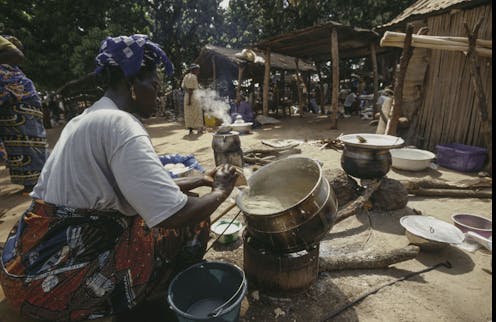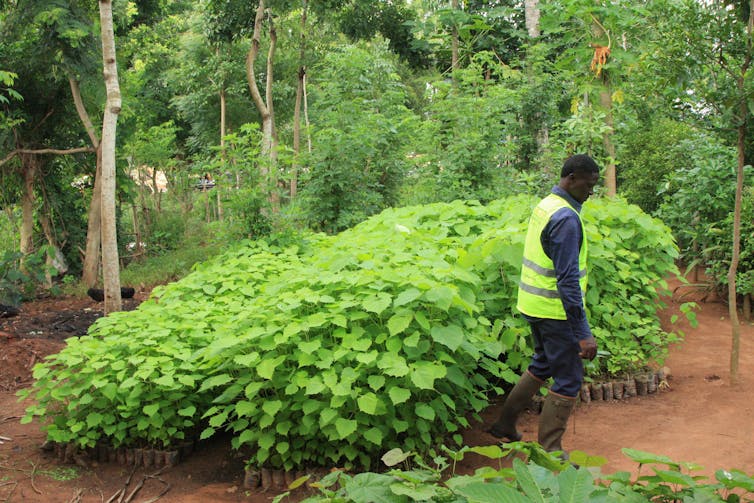
Like many African cities, Lomé, the capital of Togo, has a pollution problem.
Its ambient (outdoor) air pollution levels exceed World Health Organization (WHO) guidelines for human health protection. Air pollution is the world’s largest environmental health risk. In Togo, a country of 8 million people, it contributes to 6,700 premature deaths per year.
Air pollutant emissions and emissions that contribute to climate change come largely from the same sources. They include fuel combustion in households, transport, industry, and burning of agricultural and municipal waste. Some pollutants, like black carbon and methane, contribute to both climate warming and air pollution.
So it makes sense to tackle the two issues together. The question is, how?
To do so, the government of Togo has developed a climate change plan, called its Nationally Determined Contribution, which describes its climate change commitment. It has also developed a National Action Plan to Reduce Air Pollutants, which outlines actions to reduce air pollution.
To inform the development of these plans, we evaluated the impact that implementing ten mitigation measures in Togo would have on reducing air pollutants and climate pollutants simultaneously.
Togo is not the only West African country using climate change plans as public health improvement strategies. Before the 26th UN Climate Change Conference of the Parties (COP26) in Glasgow in 2021, Nigeria, Ghana, and Côte d’Ivoire submitted climate change plans.
If fully implemented, these plans could reduce thousands of premature deaths every year by improving air quality.
Showing how climate change plans can improve human health locally provides additional motivation to carry out the plans.
If all countries followed climate change plans like these, the global health benefit would be substantial. Over one million premature deaths could be avoided annually by 2050 because of air quality improvements.
Read more: Air pollution in fast-growing African cities presents a risk of premature death
What we found
We quantified the emissions for Togo and Grand Lomé from all major source sectors for the years between 2010 and 2018. Togo emitted an estimated 21 million tonnes of greenhouse gas emissions in 2018, predominantly from the energy, agriculture, forestry and other land use sectors. These emissions are projected to increase 42% to 30 million tonnes in 2030 if nothing is done. Without intervention air pollution is also expected to worsen, with emissions estimated to increase by between 16% and 60% across different air pollutants.
We found a large overlap in the major emission sources of gases and particles contributing to both climate change and degraded air quality in Togo. The overlap provides a substantial opportunity to design integrated strategies that simultaneously improve air quality and mitigate climate change.
Our assessment modelled how implementing ten mitigation measures in these overlapping sources would affect emissions.
We showed that fully implementing Togo’s two plans would reduce greenhouse gas emissions by 20% in 2030 compared to a baseline scenario, and lead to a reduction of between 25% and 78% in emissions of various health-damaging air pollutants.
Our paper provides a clear pathway for Togo to reduce its already small contribution to climate change while simultaneously achieving local benefits for air quality and human health.
The 10 mitigation measures we assessed, which are now included in Togo’s air pollution and climate change plans, included the following:
expanding renewable electricity generation
increasing use of more efficient vehicles and electric vehicles
increasing use of cleaner fuels and more efficient stoves for cooking
increasing efficiency of charcoal production
reducing energy intensity of livestock and crop production
decreasing the rate of deforestation
capturing the use of methane from landfills and reducing open waste burning.
Reducing the rate of deforestation was the mitigation action that would make the largest difference to Togo’s contribution to climate change. Switching to cleaner fuels for cooking in Togo would achieve the largest reduction in air pollutant emissions.
These measures are closely linked. Currently, wood and charcoal are the fuels most commonly used for cooking in Togo. They contribute to poor air quality and to deforestation. Therefore, switching to cleaner fuels, or more efficient biomass stoves, is not only the most effective action to reduce air pollution in Togo, but also simultaneously helps achieve the largest climate change benefit through reduced deforestation.

Next steps
This first assessment provides the basis for future routine updates of integrated air pollution and climate change mitigation. It can be used to monitor how Togo’s plans and strategies are being put into practice. And it can be adjusted as the situation changes.
Read more: Renewable energy could get Togo to its goals: experts identify what's in the way
Chris Malley receives funding from United Nations Development Programme (UNDP) Climate Promise, the United Kingdom Engineering and Physical Sciences Research Council (EPSRC) and the Climate and Clean Air Coalition Supporting National Action & Planning initiative.
This article was originally published on The Conversation. Read the original article.







